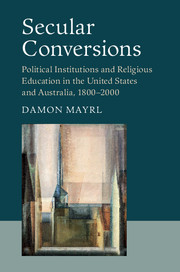 Secular Conversions
Secular Conversions Book contents
- Frontmatter
- Contents
- List of Figures and Tables
- Acknowledgments
- List of Acronyms
- Introduction
- 1 Politics, Institutions, and Secularization
- Part I Forging the nineteenth-century settlement
- Part II The nineteenth-century settlement in transition
- Part III Forging the twentieth-century settlement
- Part IV Implications
- Epilogue: Toward a Twenty-First-Century Settlement?
- Index
Introduction
Published online by Cambridge University Press: 05 August 2016
- Frontmatter
- Contents
- List of Figures and Tables
- Acknowledgments
- List of Acronyms
- Introduction
- 1 Politics, Institutions, and Secularization
- Part I Forging the nineteenth-century settlement
- Part II The nineteenth-century settlement in transition
- Part III Forging the twentieth-century settlement
- Part IV Implications
- Epilogue: Toward a Twenty-First-Century Settlement?
- Index
Summary
On 17 June, 1963, the United States Supreme Court banned the devotional reading of the Bible and the saying of the Lord's Prayer in American public schools. Finding that the practices unequivocally constituted “religious exercises,” it declared that they were “required by the States in violation of the command of the First Amendment that the Government maintain strict neutrality, neither aiding nor opposing religion.” The decision, coming on the heels of a decision the previous year prohibiting nondenominational prayers in the public schools, firmly closed the door on nearly two hundred years of religious exercises in American schools. It also fed a strong backlash. Religious and political leaders denounced the decision, school officials around the country defiantly vowed to continue the practices irrespective of the decision, and scores of federal legislators introduced Constitutional amendments to reverse the decision. Nevertheless, these efforts ultimately failed, and within twenty years official Bible reading and school prayer had virtually vanished from schools outside the South, while even in the South their frequency had declined substantially.
Just five months later, half a world away, Australian Prime Minister Robert Menzies shocked political observers by announcing in a campaign speech that he intended to begin to provide federal funding for science education, to be made “available to all secondary schools, government or independent, without discrimination.” The proposal represented a marked departure from Australia's longstanding policy, dating to the late nineteenth century, against providing funding to religious schools. Following his reelection, Menzies implemented his proposal over his opponents’ accusations that he was trying to buy Catholic votes. The legislation was “conceived in chicanery, born in duplicity, and nurtured on deceit,” declared the opposition leader; while another Member of Parliament lamented that “the political bribery” the bill represented had “never been surpassed in Australia's history.” Nevertheless, the legislation passed easily, and was quickly followed by a spate of additional subsidies that cemented “state aid” to religious schools as a permanent feature of the Australian educational landscape.
Separated by space but not by time, these two scenes are important moments that heralded the arrival of new secular settlements – that is, relatively stable sets of policies governing the role of religion in particular social domains – in each country. Secular settlements have become an important focus of research on secularization in recent years.
- Type
- Chapter
- Information
- Secular ConversionsPolitical Institutions and Religious Education in the United States and Australia, 1800–2000, pp. 1 - 10Publisher: Cambridge University PressPrint publication year: 2016


